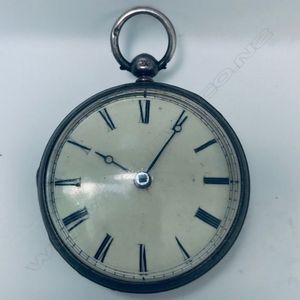Victorian Silver Cylinder Pocket Watch
Early Victorian silver open face English cylinder pocket watch, 1.93 in. machine engraved case, hallmarked London 1841 by Henry Deacon English cylinder movement with engraved backplate and pierced cock. Off white enamel dial, Roman numerals, rail track minutes. Fine Breguet hands.
You must be a subscriber, and be logged in to view price and dealer details.
Register Now to view actual auction price for this item.
- Movement - The technical name for the workings of a clock or watch, and does not include the dial or case.
- Victorian Period - The Victorian period of furniture and decorative arts design covers the reign of Queen Victoria from 1837 to 1901. There was not one dominant style of furniture in the Victorian period. Designers used and modified many historical styles such as Gothic, Tudor, Elizabethan, English Rococo, Neoclassical and others, although use of some styles, such as English Rococo and Gothic tended to dominate the furniture manufacture of the period.
The Victorian period was preceded by the Regency and William IV periods, and followed by the Edwardian period, named for Edward VII (1841 – 1910) who was King of the United Kingdom and the British Dominions and Emperor of India for the brief period from 1901 until his death in 1910. - Back Plate - On many types of clocks, the movement operates between two plates, usually made of brass, one at the back, and the other at the front, which forms a mount for the dial.
On English bracket, mantle and table clocks the backplate was often visible through a glass door or panel from the late 17th century, and could be profusely engraved with scrolling decorations, flowers, foliage, birds, and figures. The engraving could also include the maker’s name.
The amount of engraving reduced and became simpler as the 18th century progressed, and by 1800, had been reduced to a border, often with the maker's name in the centre. By the early 1800s all decoration had ceased, and only the maker's name was added, and by the Victorian era, most bracket, mantle and table clocks had no engraving.
This item has been included into following indexes:
- Breguet (brand) (Switzerland) - pocket watches and wrist watches 85
-
pocket watches, case type
- open face, silver case 570
- silver case 905
- silver, open face 204
